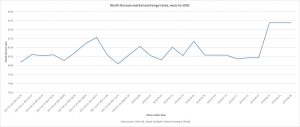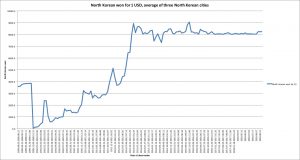As changes to the political situation on the Korean Peninsula continue in the wake of the inter-Korean, US-DPRK (abbreviation for North Korea’s formal name) and Sino-DPRK summits, Daily NK recently met with an official from North Korea’s Ministry of State Security (MSS) in China to talk about international sanctions toward North Korea and the inter-Korean relationship. The MSS officer displayed a clear anti-American bias with his own ideological convictions, but also offered some objective evaluations of the North Korean regime.
Following is a transcript of the full interview.
Daily NK (DNK): International sanctions are still in effect for North Korea, as you know.
Ministry of State Security official (MSS): They are hard to accept. I’m not sure whether South Korea is trying to make itself look good in the eyes of Trump as it accepts the continued sanctions against North Korea, but in any case, they [the sanctions] are an irritant. There are many [North Korean] restaurants in China. The sanctions have made it impossible for new workers for these restaurants to enter China, and those who are here must return to North Korea next year.
I can understand [the international community] criticizing North Korea for not living as well as capitalist countries after moving away from socialism and operating in the international market like other countries. However, I’m angry that China, Russia and the South have come together to sanction us and that the US makes us a very poor country by preventing our goods from entering the international market.
If you ask anyone in North Korea – young or old – they will respond that North Korea must fight and drop a nuke on America. I think that Chairman Kim Jong Un got rid of nuclear weapons so that the sanctions would be lifted and our lives would improve, but personally speaking, I think we should drop a nuke on New York or Washington, D.C.
Why are South Koreans so angry about us making intercontinental ballistic missiles? We are seeking peace by destroying our [nuclear] underground facilities, but the US has simply stopped its military exercises. They could restart them again [at any time]. They claim they will get rid of the sanctions eventually but it’s hard to believe that.
DNK: The inter-Korean atmosphere, however, is focused on continuing exchanges and cooperation.
MSS: The sanctions must be lifted first for anything to really happen. With the sanctions still in effect, I could accept that President Moon Jae-in is the “trailblazer of the Korean people,” but he continues to look to America for guidance. We could ask South Korea to lift the sanctions, but they just do what America tells them to do. We are a brave people made up of the worker class, who form the basis of the socialist revolution. We have nothing to lose from a war. South Korea would hate to go to war, but the majority of us [North Koreans] would go to war without hesitation.
DNK: Have you ever watched South Korean dramas before?
MSS: Yes, I’ve watched them in secret in China. I have seen defectors on South Korean dramas like ‘Now on my way to meet you’ and ‘Moranbong Club.’ They don’t necessarily lie about everything; they get some things right. It is true life in North Korea is hard and that there are almost no rations from the government. There are some places that only give two-weeks worth of rations and people make up for the lack of food by going into business and cooking corn porridge, and some people even die due to the lack of food.
However, some defectors say that residents just walk by dead bodies on the street. How could that even be possible in a place inhabited by human beings? Even during the Arduous March [widespread famine of the mid-1990s], that wasn’t the case. Soldiers and inminban [neighborhood watch-like units] dug graves to bury the dead. That [walking by dead bodies] wouldn’t have even happened in Korea’s feudal period.
When I asked someone why the defectors lie like that, I was told that they are given money to appear on such TV shows. They received free education and healthcare in North Korea, but now they turn around and spit on their own country. They talk trash about their own country. I can acknowledge that life is tough in North Korea, and that people are hungry and there is no electricity so it’s difficult for factories to operate. But they [defectors] exaggerate too much.
Generally speaking, the women that go to South Korea end up living fairly well and the reality is that people [North Koreans] go to South Korea. However, half of them have committed some type of crime. They have fled because they have the police on their tail. At least half of them are in this situation. They have run away because they have committed a crime like borrowing money from people, and being unable to pay the money back, they have run away before getting caught by the police and being sent to a labor camp.
It is these types of people who come out on TV, crying and telling lies. I would be extremely upset if I lived [in the type of country they are describing]. There are difficulties in North Korea, but real people live there.
DNK: Does the North Korean state still have ironclad control over the country?
MSS: It is still difficult for people to move around freely. Nobody can go from the provinces into Pyongyang. You must have a pass to do that. I hope that the country will soon become like China where you only need a residence card to travel. We have a lot of problems. I hope that these problems will be resolved.
In China, people can send instant messages to those living in Germany or England. North Koreans can take pictures with their cellphones, but cannot use the internet. North Koreans cannot make international calls, either. They couldn’t even dream of it.
The state is worried about the impact of bringing in ‘capitalist-related things’ into the country because they could dampen the people’s ideological stance. I think in some ways the state’s restrictions on foreign things has helped keep North Korea’s ideological stance free of contamination.


